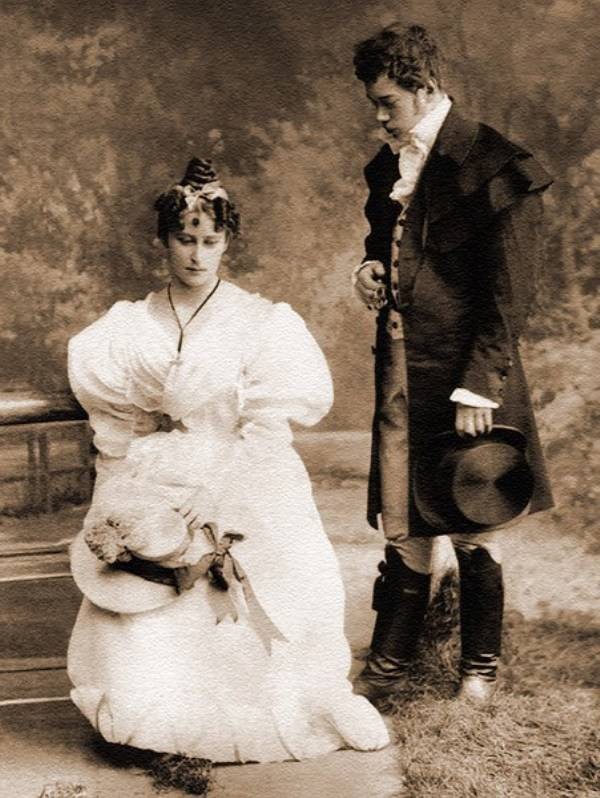
Nicholas of Russia and Elizabeth of Hesse, as Eugene and Tatyana, credit Wikipedia
Belles Lettres
Eugene Onegin, composer Pyotr Ilyich Tchaikovsky, based on Eugene Onegin (1823-31) by Alexander Pushkin, libretto by Tchaikovsky and Konstantin Shilovsky, Opera Holland Park, 11th June 2022, a new production directed by Julia Burbach, City of London Sinfonia and Opera Holland Park Chorus conducted by Lada Valešová, reviewed by Leslie Jones
Tatyana, played by British-Armenian soprano Anush Hovhannisyan, is something of a sentimentalist, one of those avid female readers of novels unable, according to Denis Diderot, to distinguish between fiction and reality (see Belinda Jack, ‘Tatyana’s Bookishness’, Official Programme). She confides that she saw Onegin before she saw him, i.e. that he was a fantasy or projection. Tatyana’s mother, Madame Larina (Amanda Roocroft) confirms that she too was once intoxicated by Samuel Richardson’s A History of Sir Charles Grandison and was ‘dreaming of another’ who ‘pleased her more in heart and mind’ than her eventual husband. But habit, as Madame Larina and the nurse Filippyevna (Kathleen Wilkinson) aver, is ‘heaven’s gift to us, sent as a replacement for happiness’. Contrary to romantic fiction, ‘there are no heroes in real life’. Tatyana, in due course, will draw similar conclusions.
Feminists and neo-Freudians have had a field day interpreting Tatyana’s personality. One widely held opinion is that she is a sexually frustrated victim of a repressive patriarchal social order. Upper class Russian women had no option but to prepare for marriage and motherhood. And given that the plot partly focuses on two men, the influence on the opera of Tchaikovsky’s homosexuality is hard to avoid. Indeed, it transpires that when he was composing it, he received a fateful letter from Antonina Milyukova, declaring her love for him. Bizarrely, the composer’s disdain for Onegin’s offhand treatment of Tatyana led him to encourage Antonina, since “to behave like Onegin would be heartless and quite impermissible on my part”. The upshot was his disastrous marriage, in July 1877 (see ‘Looking for Lensky’, Philip Ross Bullock, Official Programme).
Like The Queen of Spades, Eugene Onegin is “beautifully orchestrated and replete with moving arias and grand choruses” (see Quarterly Review, January 17, 2019 ‘When the Fun Stops, Stop’). The folk songs performed by the chorus are compelling, notably the risqué peasant’s song ‘Vayinu, vayinu’, with its distinct echoes of the composer’s ‘Little Russian’ Symphony no 2.
After a pedestrian start, the performance took off during the famous letter scene. Much of what we then see and hear on stage is evidently not real but imagined by Tatyana. Throughout, older and more mature characters are counterposed to the younger and the more innocent. Thus, Onegin employs the “I am older and more experienced than you” put down and advises Tatyana to control herself. Aging and death as a merciful release are also salient themes. ‘Where did you go to my golden youth’, wonders Onegin. Lensky, likewise, considers the ‘coming darkness’ blessed.
Part of the charm of Opera Holland Park is the unexpected intrusion of noises off. On this occasion, a barking dog provided some welcome, comic relief.
Dr Leslie Jones is Editor of QR










